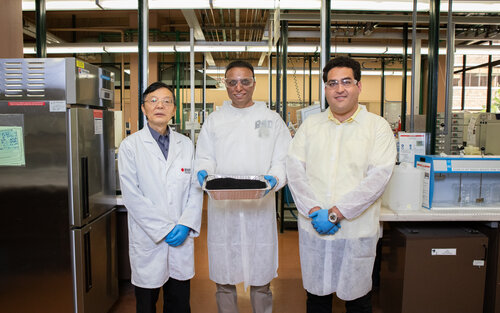
A Victorian council has partnered with a team of researchers to conduct a world-first trial that’s seeing coffee grounds incorporated in concrete footpaths as a replacement for sand.
The trial, led by Dr Rajeev Roychand and colleagues at RMIT, involves turning coffee grounds into a charcoal like substance known as biochar by exposing them to temperatures of 350C without oxygen, and then adding it to concrete.
Untreated organic waste can’t be added directly to concrete because it decomposes, but transformed into biochar, it can make concrete 30 per cent stronger, the researchers say.

The technique can also turn other organic waste, including wood chips, into biochar.
The team is collaborating with Macedon Ranges council, located between Melbourne and Bendigo, to trial both types of biochar in concrete footpaths in local streets.
“We’re going to have people walking across the concrete that includes these products and RMIT is going to be coming back and doing testing to see how they stand up,” Council’s Director of Assets and Operations Shane Walden said.
Residents can’t see or smell any difference in the final concrete product, he says.
Using recycled materials in construction
The research has been published in the Journal of Cleaner Production and Construction and Building Materials.
Dr Roychand says it’s exciting to be conducting the trial, which he hopes will increasingly see river sand replaced by recycled materials.
“Sand is getting scarce over time, and this waste can replace up to 15 per cent of the sand in concrete,” he said.
The research team says if the Macedon Ranges trial is successful it could result in the practice being rolled out more widely.
“We are currently working in the supply chain sector so that we can make this research into a mainstream product for commercial applications, and we’re not only looking into coffee – we’re expanding this into all forms of different organic waste,” Dr Roychand says.
“Every biochar produced from a different organic material comes with varying composition, in addition to the difference in carbon content, particle size and absorbency, that can boost the performance of concrete in a range of ways.”
Potential cost savings
He says the research has the potential to reduce cement content, resulting in significant cost savings.
“Since we are achieving a 30 per cent increase in strength for the coffee concrete, this could reduce the required cement content by as much as 10 per cent, based on our previous experience,” Roychand said.
Australia generates 75 million kilograms of ground coffee waste every year, most of which ends up in landfill.
This could 655 million kilograms of sand in concrete because it is a denser material, the researchers say.
Globally, the 10 billion kilograms of used coffee generated each year could replace up to 90 billion kilograms of sand in concrete.
Mr Walden says councils can play an important role in pioneering new technologies.
“This not only helps improve the knowledge level of our contractors and our staff, but it also has lots of other benefits and benefits that are important to our community,” he says.
“This includes helping the environment, acting sustainably and, most importantly, reducing waste to landfill and having a circular economy.”
Comment below to have your say on this story.
If you have a news story or tip-off, get in touch at editorial@governmentnews.com.au.
Sign up to the Government News newsletter
